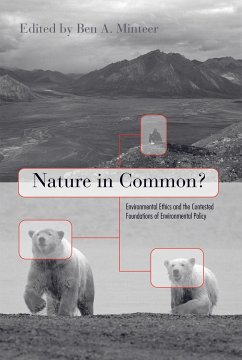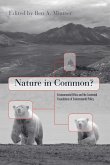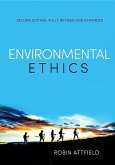Nature in Common?
Environmental Ethics and the Contested Foundations of Environmental Policy
Herausgeber: Minteer, Ben
Nature in Common?
Environmental Ethics and the Contested Foundations of Environmental Policy
Herausgeber: Minteer, Ben
- Gebundenes Buch
- Merkliste
- Auf die Merkliste
- Bewerten Bewerten
- Teilen
- Produkt teilen
- Produkterinnerung
- Produkterinnerung
A groundbreaking contribution to a central debate in environmentalism
Andere Kunden interessierten sich auch für
![Nature in Common? Nature in Common?]() Nature in Common?35,99 €
Nature in Common?35,99 €![Environmental Ethics: Duties to and Values in the Natural World Environmental Ethics: Duties to and Values in the Natural World]() Holmes RolstonEnvironmental Ethics: Duties to and Values in the Natural World71,99 €
Holmes RolstonEnvironmental Ethics: Duties to and Values in the Natural World71,99 €![Cool Food Cool Food]() Robert DowneyCool Food24,99 €
Robert DowneyCool Food24,99 €![The Seasons Alter: How to Save Our Planet in Six Acts The Seasons Alter: How to Save Our Planet in Six Acts]() Philip KitcherThe Seasons Alter: How to Save Our Planet in Six Acts20,99 €
Philip KitcherThe Seasons Alter: How to Save Our Planet in Six Acts20,99 €![The Ethics of Giacomo Leopardi: A Philosophy for the Environmental Crisis The Ethics of Giacomo Leopardi: A Philosophy for the Environmental Crisis]() Alice GibsonThe Ethics of Giacomo Leopardi: A Philosophy for the Environmental Crisis122,99 €
Alice GibsonThe Ethics of Giacomo Leopardi: A Philosophy for the Environmental Crisis122,99 €![Environmental Ethics Environmental Ethics]() Robin AttfieldEnvironmental Ethics77,99 €
Robin AttfieldEnvironmental Ethics77,99 €![Animals Matter: Resistance and Transformation in Animal Commodification Animals Matter: Resistance and Transformation in Animal Commodification]() Animals Matter: Resistance and Transformation in Animal Commodification137,99 €
Animals Matter: Resistance and Transformation in Animal Commodification137,99 €-
-
-
A groundbreaking contribution to a central debate in environmentalism
Hinweis: Dieser Artikel kann nur an eine deutsche Lieferadresse ausgeliefert werden.
Hinweis: Dieser Artikel kann nur an eine deutsche Lieferadresse ausgeliefert werden.
Produktdetails
- Produktdetails
- Verlag: Temple University Press
- Seitenzahl: 312
- Erscheinungstermin: 15. April 2009
- Englisch
- Abmessung: 229mm x 160mm x 25mm
- Gewicht: 544g
- ISBN-13: 9781592137039
- ISBN-10: 1592137032
- Artikelnr.: 25945653
- Herstellerkennzeichnung
- Libri GmbH
- Europaallee 1
- 36244 Bad Hersfeld
- gpsr@libri.de
- Verlag: Temple University Press
- Seitenzahl: 312
- Erscheinungstermin: 15. April 2009
- Englisch
- Abmessung: 229mm x 160mm x 25mm
- Gewicht: 544g
- ISBN-13: 9781592137039
- ISBN-10: 1592137032
- Artikelnr.: 25945653
- Herstellerkennzeichnung
- Libri GmbH
- Europaallee 1
- 36244 Bad Hersfeld
- gpsr@libri.de
Ben A. Minteer is Assistant Professor of Environmental Ethics and Policy in the School of Life Sciences and affiliated Assistant Professor of Philosophy at Arizona State University. He is author of The Landscape of Reform: Civic Pragmatism and Environmental Thought in America.
Acknowledgments
PART I Introduction
1. Unity among Environmentalists? Debating the Values-Policy Link in
Environmental Ethics
PART II The Convergence Hypothesis Debate in Environmental Ethics: The
First Wave
2. Contextualism and Norton’s Convergence Hypothesis
3. Convergence and Contextualism: Some Clarifications and a Reply to
Steverson
4. Why Norton’s Approach Is Insufficient for Environmental Ethics
5. Convergence in Environmental Values: An Empirical and Conceptual
Defense
6. The Relevance of Environmental Ethical Theories for Policy Making
PART III Expanding the Discussion: The Convergence Hypothesis Debate Today
7. Converging versus Reconstituting Environmental Ethics
8. Environmental Ethics and Future Generations
9. The Convergence Hypothesis Falsified: Implicit Intrinsic Value,
Operational Rights, and De Facto Standing in the Endangered Species Act
10. Convergence in an Agrarian Key
11. Convergence and Ecological Restoration: A Counterexample
12. Does a Public Environmental Philosophy Need a Convergence Hypothesis?
13. The Importance of Creating an Applied Environmental Ethics: Lessons
Learned from Climate Change
14. Who Is Converging with Whom? An Open Letter to Professor Bryan Norton
from a Policy Wonk
PART IV Reply by Bryan G. Norton
15. Convergence and Divergence: The Convergence Hypothesis Twenty Years
Later
Contributors
Notes
Index
PART I Introduction
1. Unity among Environmentalists? Debating the Values-Policy Link in
Environmental Ethics
PART II The Convergence Hypothesis Debate in Environmental Ethics: The
First Wave
2. Contextualism and Norton’s Convergence Hypothesis
3. Convergence and Contextualism: Some Clarifications and a Reply to
Steverson
4. Why Norton’s Approach Is Insufficient for Environmental Ethics
5. Convergence in Environmental Values: An Empirical and Conceptual
Defense
6. The Relevance of Environmental Ethical Theories for Policy Making
PART III Expanding the Discussion: The Convergence Hypothesis Debate Today
7. Converging versus Reconstituting Environmental Ethics
8. Environmental Ethics and Future Generations
9. The Convergence Hypothesis Falsified: Implicit Intrinsic Value,
Operational Rights, and De Facto Standing in the Endangered Species Act
10. Convergence in an Agrarian Key
11. Convergence and Ecological Restoration: A Counterexample
12. Does a Public Environmental Philosophy Need a Convergence Hypothesis?
13. The Importance of Creating an Applied Environmental Ethics: Lessons
Learned from Climate Change
14. Who Is Converging with Whom? An Open Letter to Professor Bryan Norton
from a Policy Wonk
PART IV Reply by Bryan G. Norton
15. Convergence and Divergence: The Convergence Hypothesis Twenty Years
Later
Contributors
Notes
Index
Acknowledgments
PART I Introduction
1. Unity among Environmentalists? Debating the Values-Policy Link in
Environmental Ethics
PART II The Convergence Hypothesis Debate in Environmental Ethics: The
First Wave
2. Contextualism and Norton’s Convergence Hypothesis
3. Convergence and Contextualism: Some Clarifications and a Reply to
Steverson
4. Why Norton’s Approach Is Insufficient for Environmental Ethics
5. Convergence in Environmental Values: An Empirical and Conceptual
Defense
6. The Relevance of Environmental Ethical Theories for Policy Making
PART III Expanding the Discussion: The Convergence Hypothesis Debate Today
7. Converging versus Reconstituting Environmental Ethics
8. Environmental Ethics and Future Generations
9. The Convergence Hypothesis Falsified: Implicit Intrinsic Value,
Operational Rights, and De Facto Standing in the Endangered Species Act
10. Convergence in an Agrarian Key
11. Convergence and Ecological Restoration: A Counterexample
12. Does a Public Environmental Philosophy Need a Convergence Hypothesis?
13. The Importance of Creating an Applied Environmental Ethics: Lessons
Learned from Climate Change
14. Who Is Converging with Whom? An Open Letter to Professor Bryan Norton
from a Policy Wonk
PART IV Reply by Bryan G. Norton
15. Convergence and Divergence: The Convergence Hypothesis Twenty Years
Later
Contributors
Notes
Index
PART I Introduction
1. Unity among Environmentalists? Debating the Values-Policy Link in
Environmental Ethics
PART II The Convergence Hypothesis Debate in Environmental Ethics: The
First Wave
2. Contextualism and Norton’s Convergence Hypothesis
3. Convergence and Contextualism: Some Clarifications and a Reply to
Steverson
4. Why Norton’s Approach Is Insufficient for Environmental Ethics
5. Convergence in Environmental Values: An Empirical and Conceptual
Defense
6. The Relevance of Environmental Ethical Theories for Policy Making
PART III Expanding the Discussion: The Convergence Hypothesis Debate Today
7. Converging versus Reconstituting Environmental Ethics
8. Environmental Ethics and Future Generations
9. The Convergence Hypothesis Falsified: Implicit Intrinsic Value,
Operational Rights, and De Facto Standing in the Endangered Species Act
10. Convergence in an Agrarian Key
11. Convergence and Ecological Restoration: A Counterexample
12. Does a Public Environmental Philosophy Need a Convergence Hypothesis?
13. The Importance of Creating an Applied Environmental Ethics: Lessons
Learned from Climate Change
14. Who Is Converging with Whom? An Open Letter to Professor Bryan Norton
from a Policy Wonk
PART IV Reply by Bryan G. Norton
15. Convergence and Divergence: The Convergence Hypothesis Twenty Years
Later
Contributors
Notes
Index








